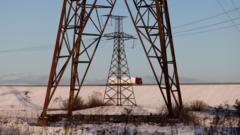The Baltic states are finalizing plans to sever their long-standing ties with the Russian power grid, marking a significant milestone in energy independence and geopolitical security.
Baltic States Set for Groundbreaking Disconnect from Russian Power Grid

Baltic States Set for Groundbreaking Disconnect from Russian Power Grid
Estonia, Latvia, and Lithuania prepare for a historic shift to EU electricity integration amidst rising security concerns.
In a bold move towards energy independence, Estonia, Latvia, and Lithuania are set to officially disconnect from the Russian-controlled Brell power grid, with a transition scheduled to start on Saturday. This decision comes as the three nations, which have been cautiously reliant on the grid since the end of World War Two, aim to join the European Union's electricity network. With a countdown clock positioned in Lithuania's capital, the event will feature EU chief Ursula von der Leyen to mark the historical disconnect.
To ensure readiness, authorities have advised residents to charge their electronic devices and prepare for potential disruptions, including power outages and non-functional traffic lights. After approximately 24 hours of operating in "isolated mode," the Baltic states will rejoin the European grid through Poland. Lithuanian Energy Minister Zygimantas Vaiciunas emphasized the importance of this move, stating it removes Russia's leverage for geopolitical blackmail.
The transition follows increasing tensions between the Baltic states and Russia, particularly in light of Moscow's invasion of Ukraine. This conflict has ignited fears of retaliation and prompted incidents of sabotage targeting key infrastructure like electricity cables. In response, NATO has ramped up its monitoring efforts in the region to safeguard against potential provocations as the Baltic states embark on this transformative energy journey.
Latvian officials echoed the sentiment of cautious optimism while highlighting contingency plans in place for potential risks, including cybersecurity threats and misinformation campaigns. With international cooperation bolstering their defenses, the leaders of these nations remain committed to ensuring a smooth transition to the European energy framework. Amidst uncertain geopolitical waters, the Baltic states appear determined to secure their energy futures and navigate the complexities of regional dynamics.





















